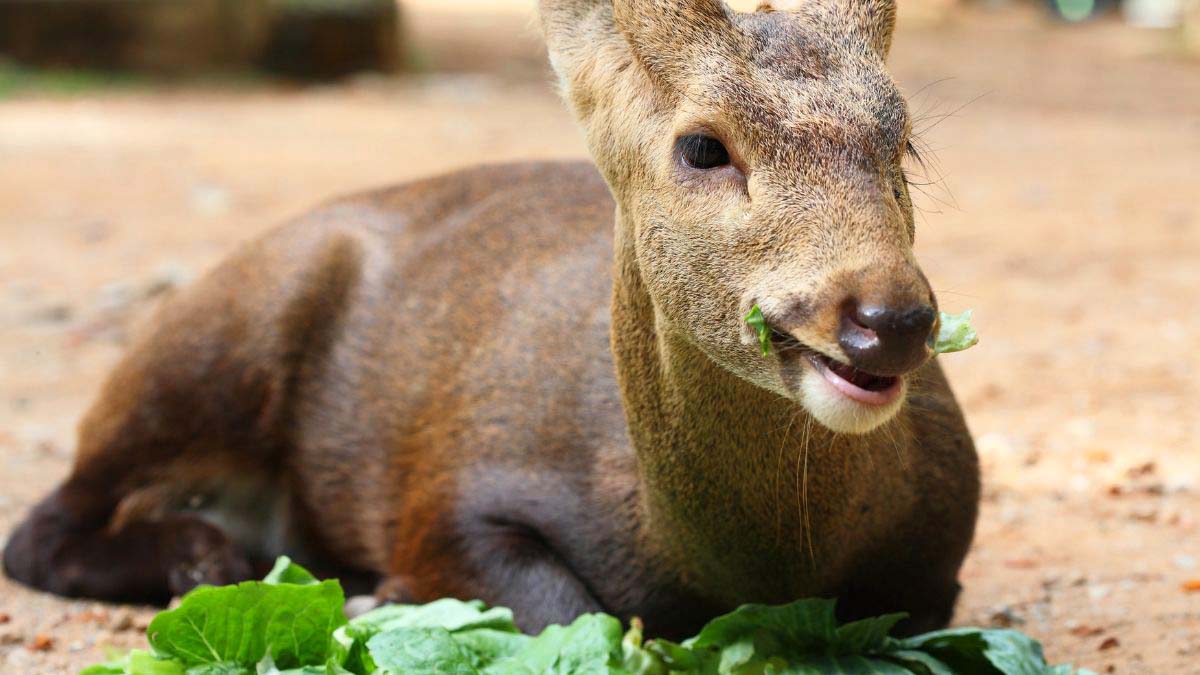Yes, deer will eat tomato plants if given the opportunity. Tomatoes are a common target for deer feeding.
Gardening and cultivating your own fruits and vegetables can be a rewarding experience. However, it can also come with challenges, such as dealing with wildlife that may be attracted to your plants, including deer. Understanding the feeding habits of deer and how to protect your garden from them can be crucial in ensuring a successful harvest.
We’ll explore whether deer are inclined to eat tomato plants and provide tips on how to prevent deer damage in your garden. By implementing the right strategies, you can enjoy your homegrown tomatoes without the threat of deer interference.
Understanding Deer Behavior
Deer behavior can be influenced by many factors, including their diet. Deer are known for consuming a wide variety of plants, and tomato plants are no exception. Understanding the behavior of deer and their feeding patterns can help gardeners protect their crops.
Understanding Deer Behavior Deer are opportunistic herbivores that consume various plants, including tomato plants. By recognizing their eating habits and attraction to gardens, you can effectively protect your tomato plants.

Deer Eating Habits
Deer primarily feed during early mornings and evenings, making them nocturnal and crepuscular animals. They are known to be selective browsers, preferring tender young shoots and leaves over mature foliage.
Deer Attraction To Gardens
Deer are attracted to gardens due to the availability of succulent plants and also the proximity to protective cover and water sources. Their preference for easily accessible and palatable vegetation often leads them to encroach on residential areas. By understanding deer behavior, it becomes evident that they are drawn to gardens due to the supply of nourishing plants and the protection provided by the surrounding habitat. This insight enables gardeners to implement effective strategies to deter deer from consuming tomato plants whilst minimizing harm to the deer population.
Identifying Deer Damage On Tomato Plants
Signs Of Deer Feeding
When inspecting your tomato plants for deer damage, keep an eye out for telltale signs of deer feeding, such as nibbled leaves, broken stems, and trampled foliage.
Specific Damage Caused By Deer
Deer have a distinct feeding pattern that often results in cleanly severed stems, unevenly torn leaves, and distinct hoof prints in the vicinity of damaged plants.
1. Fencing Your Garden
Fencing your garden is a great strategy to protect your tomato plants from being eaten by deer.
Different Types Of Garden Fences
When it comes to protecting your beloved tomato plants from hungry deer, one effective strategy is to fence your garden. Fencing not only acts as a physical barrier to keep deer out but also adds a decorative touch to your garden. There are different types of fences you can choose from, depending on your specific needs and preferences.
Picket Fences
Picket fences are a popular choice for many gardeners. These charming fences consist of upright wooden boards placed close together, creating a visual barrier while still allowing air and sunlight to reach your tomato plants. Picket fences not only serve their purpose but also add a touch of whimsy to your garden.
Wire Mesh Fences
If you’re looking for a more affordable and practical option, wire mesh fences are an excellent choice. These fences are made of sturdy wire mesh, which creates a solid barrier against deer intrusion. Wire mesh fences are easy to install and provide maximum protection for your tomato plants.
Electric Fences
For those dealing with persistent deer problems, electric fences can be a game-changer. These fences use a low-voltage electric charge to deter deer from entering your garden. When deer come into contact with the electric fence, they receive a harmless shock and quickly learn to avoid the area. Electric fences are highly effective, but it’s important to follow the proper safety precautions and regulations.
Installing And Maintaining A Fence
Once you’ve chosen the right fence for your garden, it’s essential to install and maintain it properly to ensure maximum effectiveness.
Installation
- Firstly, determine the perimeter of your garden and mark the spots where you’ll install the fence posts. Space the posts evenly apart to provide adequate support.
- Dig holes for the fence posts using a post hole digger, making sure they are deep enough to provide stability.
- Next, secure the fence posts in the holes and fill them with concrete to ensure a strong foundation.
- Attach the fence panels or wire mesh to the posts, making sure they are tightly secured to prevent any gaps that deer could squeeze through.
Maintenance
- Regularly inspect your fence for any signs of damage or wear. Repair any broken or loose parts promptly to maintain its effectiveness.
- Consider applying a coat of water-resistant sealant or paint to protect wooden fences from the elements and extend their lifespan.
- Trim any nearby branches or vegetation that may provide deer with an easy pathway over or around the fence.
With these installation and maintenance tips, your garden fence will effectively protect your tomato plants and keep those pesky deer at bay.

2. Deterrent Scents And Sprays
If you’re looking for a natural way to keep deer away from your precious tomato plants, consider using deterrent scents and sprays. Deer have a keen sense of smell, and certain scents can be off-putting to them, deterring them from making a meal out of your plants.
Natural Deer Repellents
There are several natural deer repellents available that can help protect your tomato plants without harming the deer or the environment. These repellents use ingredients that deer find unpleasant, causing them to steer clear of your garden.
- Peppermint oil: Deer do not like the strong scent of peppermint. By applying peppermint oil around your tomato plants, you can create a barrier that deters them from coming near.
- Lavender: Deer have an aversion to the strong smell of lavender. Planting lavender near your tomatoes can help keep the deer at bay.
- Eggs: Believe it or not, deer are not fans of the smell of eggs. Mixing rotten eggs with water and spraying it around your tomato plants can be an effective natural deterrent.
Homemade Deterrent Sprays
If you prefer to make your own deterrent spray, there are a few simple recipes you can try. These homemade sprays are easy to make and can be just as effective as store-bought options.
| Ingredients | Instructions |
| Dish soap | Mix 2 tablespoons of dish soap with 1 quart of water. Spray the mixture on and around your tomato plants. |
| Garlic cloves | Blend 10 garlic cloves with 1 cup of water. Strain the mixture and spray it on your tomato plants. |
| Hot sauce | Mix 2 tablespoons of hot sauce with 1 quart of water. Spray the mixture on and around your tomato plants. |
These homemade deterrent sprays can be applied directly to the foliage of your tomato plants or to the surrounding soil. They create an unpleasant scent for deer, keeping them away from your garden.
3. Using Motion-activated Devices

Using motion-activated devices is an effective strategy to prevent deer from eating tomato plants. These devices detect movement and emit sounds or spray water, keeping the deer away and protecting your plants.
Motion Sensor Sprinklers
Tomato plants are a favorite snack for deer, which can be disheartening for gardeners. However, there are strategies you can employ to deter these hungry critters from feasting on your tomato plants. One effective method is using motion-activated devices. One popular option is motion sensor sprinklers. These specialized sprinklers are equipped with motion sensors that detect the presence of deer in your garden. When a deer approaches, the sensor triggers the sprinkler to spray a burst of water. The sudden spray startles the deer, causing them to retreat quickly. It serves as a proactive way to protect your tomato plants and deter deer from coming back.
Ultrasonic Deer Repellents
Another motion-activated device that can help keep deer away from your tomato plants is ultrasonic deer repellents. These devices emit ultrasonic waves that are inaudible to humans but irritating to deer. The high-frequency sound waves create a discomforting environment for deer, discouraging them from entering your garden. Ultrasonic deer repellents can be strategically placed around your tomato plants to create a barrier that deer are hesitant to cross.
The motion sensors ensure that the repellents are activated only when a deer gets close, making them an effective and energy-efficient solution. Using motion-activated devices like motion sensor sprinklers and ultrasonic deer repellents can play a vital role in safeguarding your tomato plants from deer damage. Installing these devices around your garden can provide a reliable and long-lasting defense against unwanted deer visitors and allow your tomato plants to grow and flourish without interference.
4. Planting Deer-resistant Varieties
One effective strategy for preventing deer from eating tomato plants is by planting deer-resistant varieties. These varieties are designed to deter deer and minimize the risk of damage to your tomato plants.
One effective approach to protect your tomato plants from deer is by planting deer-resistant varieties. These particular tomato plants have been carefully bred to possess certain characteristics that deter deer from seeing them as a tasty treat. By opting for deer-resistant tomato varieties, you can enjoy a bountiful harvest while keeping your plants safe from grazing deer.

Deer-resistant Tomato Varieties
When selecting deer-resistant tomato varieties for your garden, it’s important to consider their specific traits and features that make them unappealing to deer. Here are a few popular options:
- Mountain Magic: This compact determinate variety showcases robust resistance to both deer and blight, making it an excellent choice for gardeners looking for sturdy and protected tomato plants.
- Red Berry: Known for its sweet and juicy fruits, Red Berry is also deer-resistant. Its high productivity and resistance to cracking make it a favorite among gardeners.
- Yellow Pear: If you prefer a tomato variety with a unique shape and flavor, Yellow Pear is an ideal choice. With its resistance to deer, you can enjoy its golden yellow fruits while avoiding any deer-induced damage.
Companion Planting Strategies
Another effective method to deter deer from your tomato plants is through companion planting. By strategically selecting plants that naturally repel deer and planting them alongside your tomatoes, you create an unfavorable environment for these grazing animals. Here are some popular companion plants that help protect against deer:
- Marigolds: These bright flowers not only add beauty to your garden, but they also emit a strong odor that deer find unappealing. Placing marigolds around your tomato plants can help keep deer at bay.
- Lavender: Known for its calming scent, lavender is another deer-repelling plant. Planting lavender near your tomato plants can help deter deer while adding a pleasant aroma to your garden.
- Garlic: Deer generally dislike the strong smell of garlic. Planting garlic cloves near your tomatoes can provide an effective deterrent against these hungry animals.
By incorporating these companion plants alongside your deer-resistant tomato varieties, you create a multi-layered defense system that makes your tomato plants less appealing to deer.
5. Implementing Habitat Modification
As a strategy to protect your tomato plants from deer, implementing habitat modification can be an effective method. By making changes to the environment, you can discourage deer from entering your garden and consuming your tomato plants. This can be done through creating physical barriers and pest-proofing your garden.
Creating Physical Barriers
Physical barriers are a practical way to keep deer away from your tomato plants. This can be achieved by installing fencing around your garden. Choose a sturdy, tall fence, at least 8 feet high, to prevent deer from jumping over. Additionally, consider using electric fencing or motion-activated sprinklers to further deter deer from entering your garden.
Pest-proofing Your Garden
To pest-proof your garden, consider using repellents and deterrents that can help keep deer at bay. Apply commercial repellent sprays or create your own natural repellents using ingredients like hot pepper, garlic, or vinegar. You can also plant aromatic herbs and flowers such as mint, lavender, and marigolds, which are known to repel deer. Furthermore, consider using netting to cover your tomato plants, providing a physical barrier against deer.

Frequently Asked Questions For Do Deer Eat Tomato Plants
Do Deer Eat Tomato Plants?
Yes, deer are known to eat tomato plants, especially the leaves, flowers, and even the fruits if given the chance.
How Can I Protect My Tomato Plants From Deer?
To protect your tomato plants from deer, you can install a secure fence, use deer repellents, plant deer-resistant varieties, or consider using netting or cages.
What Are Some Deer-resistant Tomato Varieties?
Some deer-resistant tomato varieties include ‘Boxcar Willie’, ‘Mountain Magic’, ‘Lemon Boy’, ‘Sweet Million’, and ‘Celebrity’.
Are There Any Natural Remedies To Deter Deer From Tomato Plants?
Yes, some natural remedies to deter deer from tomato plants include using strong-smelling substances like garlic or hot pepper sprays, planting deer-repellent flowers, or placing predator urine around the garden.
Conclusion
To sum up, it is evident that deer do indeed have a penchant for tomato plants, causing gardeners no end of frustration. However, by implementing deterrent measures such as installing fencing or using natural repellents, you can protect your tomato plants from becoming a deer’s buffet.
Remember, preserving the integrity of your garden requires vigilance and proactive efforts to keep those hungry deer at bay. So, take the necessary steps and safeguard your beloved tomato plants from these voracious creatures.





Leave a Reply